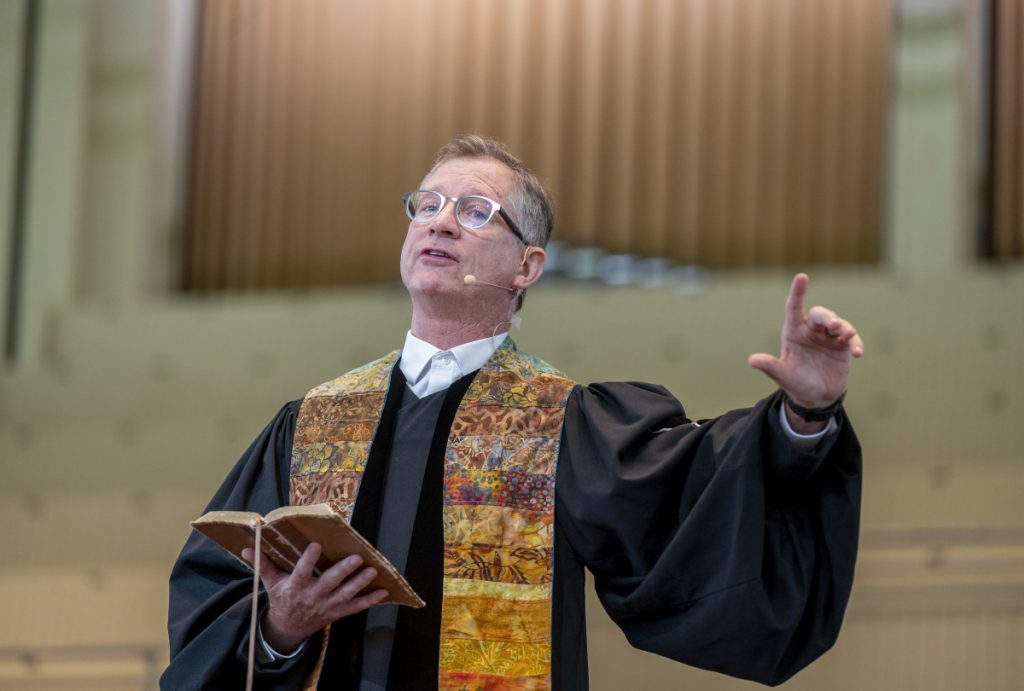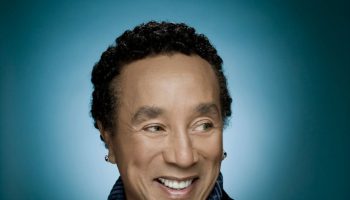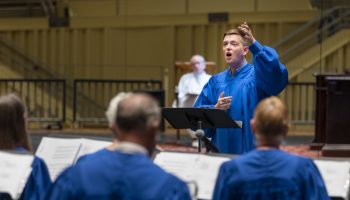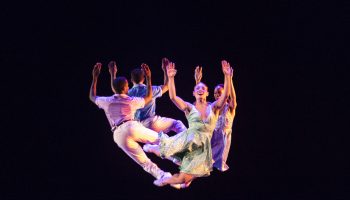MARY LEE TALBOT – STAFF WRITER

“Biblical scholar and theologian John Dominic Crossan has identified Psalm 82 as the most important Scripture in our canon. Our encounter with the holy explains who God is, but it also puts us on the path to know who we are,” said the Rev. John C. Dorhauer. He preached at the 10:45 a.m. Sunday ecumenical service of worship in the Amphitheater. His sermon title was “Who is God, and Who are We Because of God?” The Scripture reading was Psalm 82.
There is a characteristic of God in Psalm 82, Dorhauer said, and if that characteristic is missing, then God can’t be God.
“Psalm 82 is a courtroom drama,” Dorhauer said. “There is a prosecutor, multiple defendants, a judge, a jury and a sentence. Only one voice speaks; the others have no power or purpose and they have acceded to the single voice, which is prosecutor, judge and jury in one.”
“This is a divine council, in the midst of many gods,” Dorhauer continued. “Our monotheism bristles at the thought, but Israel was in an argument with other cultures, proving that their god was the one God. In the midst of this council, the One that we worship holds judgment. There were a lot of big egos in that room, and that they would let God speak says something.”
In verses 2-4 of Psalm 82, the prosecutor speaks to the assembled gods, asking, “How long will you judge unjustly and show partiality to the wicked?”
“This is the core of the problem,” Dorhauer said. “The indictment says the gods show partiality to the wicked. The prosecutor tells them to give justice to the widow and orphan, and deliver them from the wicked. They have judged unjustly and are therefore on trial. Then the prosecutor sits down.”
In verse 5, a narrator speaks. The other gods lack knowledge and understanding; they walk around in darkness and shake the foundations of the earth. “This happens when power is accrued to use for unjust purposes,” Dorhauer told the congregation. “We are living in that kind of moment. Injustice abounds when we use power for unjust reasons, rather than helping the poor who are victims of power given to the wicked.”
In verses 6 and 7, God has had enough. God’s voice is the only voice, jury and judge. The verdict and sentence are offered. God says to the others in the council, “You are children of the Most High, but you will die like mortals and fall like any prince.”
“This is solely because they used their power for people other than the needy,” Dorhauer said. “They received a death sentence for their proven unwillingness to accept their sole responsibility — that power should be distributed to the poor. They forfeited the right to be a god.”
The God who is the judge is the God we worship, who insists that if we worship this God, we will be this church, one that acts with justice. “There are powers on earth who want to be like gods, to accrue power and wealth but not help the needy,” Dorhauer said to the congregation.
“Crossan says that the living God is revealed because justice is not tangential to God. Justice is central to who we are because of this characteristic. We all have access to power and privilege and authority, but for whose purpose? To answer whose cries?”
Dorhauer continued, “If justice is not primary, if we are not answering the cries of the destitute, the needy, the widow, the orphan, the oppressed, then we are worshiping another God and we will be cast out. In worshiping the living God, we are mindful of those who have little or nothing. That is not tangential; it is central.”
The Rt. Rev. V. Gene Robinson, vice president of religion and senior pastor at Chautauqua Institution, presided. Jennifer Stitely, director of gift planning for Chautauqua Institution, read the Scripture. The prelude, played by Joshua Stafford, Jared Jacobsen Chair for the Organist and director of sacred music, was “Inning,” Op. 56, No. 4, by Robert Shumann. The anthem, sung by members of the Motet Choir, was “Be Still, for the Presence of the Lord,” music by David J. Evans, arranged by Indra Hughes. The offertory anthem, sung by members of the Motet Choir, was “Let the People Praise Thee, O God,” with music by William Mathias and words from Psalm 67. For the postlude, Stafford played “Final,” Op. 21, by César Franck. The support for this week’s services and chaplain is provided by the Daney-Holden Chaplaincy Fund.




